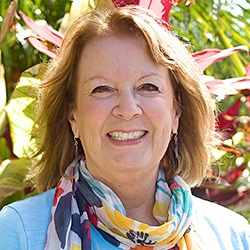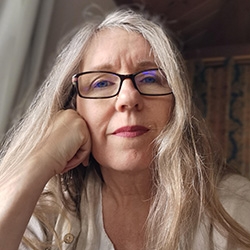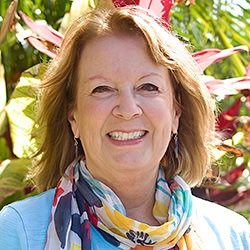

Search Results: openness
-
Trainer Tip: It's impossible to value other people’s needs and remain compassionate if we simultaneously harbor judgments. If we're willing to shift this behavior we can translate our judgments into acknowledging how something affects us. Once I got into the habit of this, my judgments began to subside dramatically. It became easy to love people and feel compassion for them, and I experienced a freedom I had never known before.
-
Creating a trusting connection and keeping the line of communication open are the primary prerequsites for giving feedback as a supervisor. Listen to Miki work with a course participant to ready herself for an upcoming feedback session.
-
Discover the power of listening to open doors and transform people in this talk.
-
Explore how to apply NVC in workplaces like construction, even when openness seems limited.
-
Listening is a cornerstone of dialogue and a powerful metaphor for spiritual practice. When we’re willing and able to listen, we open a conduit that allows connection and understanding to happen.
-
A big part of why receiving feedback is so challenging is because so few people around us know how to give feedback untainted with criticism, judgment, or our personal upset. But, if we wait for others to offer us usable, digestible, manageable feedback, we will not likely receive sufficient feedback for our growth and learning. Instead, we can grow in our capacity to fish the pearl that’s buried within. Here are three specific suggestions for how.
-
For us to open the door to seemlingly impossible societal changes, we need to find and transform enemy images in order to influence and collaborate with those who seem to be standing in our way. Here's an anecdote to show that this is what lead to Martin Luther King Jr's success in creating social change.
-
Building trust involves each person taking responsibility for what they want by identifying their needs, and making specific and doable requests that open a negotiation. Identify in what contexts you already have trust, what you want to be able to trust, and how you may be blocking or cultivating that trust. Making requests for specific actions of what to do differently can also help.
-
How we choose to communicate can either open or shut down connection.
-
It seems death cafes are everywhere these days. But how changed are we by the conversations we're now having? Not everyone is open to talking about death. It may well be that someone in your life is nearing the end of their days and their refusal to talk about it may be confusing and disheartening. How do you get them to speak when they don't want to? In this session, we will explore different approaches to navigating this tricky terrain.
-
This document is for organizations that want to integrate NVC. The intention is to use conflict as a stimulus to personal growth, more open and honest relationships, and life-affirming change. It mentions using NVC skills such as self connection, empathy, honesty, and requests (and protective use of force as last resort) to navigate the conflict with an intention of connection.
-
Listen in as Mary deftly blows the role of facilitator wide open in this excerpt from her very popular 2021 course, Facilitate NVC Groups with Joy and Confidence. She also covers a variety of useful tips such as what to do if you feel lost or confused, how to trust your gut, and ideas around utilizing empathy for yourself!
-
What are the most powerful things I can do to build an inspired relationship? I answered the question with romantic relationships in mind; however, I believe the answer below applies to all important relationships.
-
Dear friend,
There is an article from some years back by Dan Rather called, Why America Needs More Empathy. It touched me deeply when I first read it, and I happened to stumble upon it again recently. It feels so relevant and alive for me right now because he reminded me of what my parents taught me about helping other people.
-
Recently, I have been pondering anger, how I express it and the jackal story I tell myself about it. Marshall Rosenberg taught that anger is a natural emotion that is based on a judgment of someone else or myself. I agree with this, so I have been doing some “enemy images” and self-empathy work (and praying for those who are most likely to be the recipients of my anger). My goal was to clear my judgments and take responsibility for my “stuff.” It has helped a lot, and yet I still feel a general anger in me that is not directly related to anyone or any specific situation.
-
Eric Bowers explains how needs and strategies correlate to different brain hemispheres, and how relaxing into our needs opens us to greater possibilities.
-
-
Has someone ever talked to you to the extent that you're no longer enjoying it, and you now wonder if they even know you're there? Learn ways to bring in emotional understanding, engage more honestly and open-heartedly, and bridge next steps to the type of conversation that engages everyone's needs.
-
When conflict or criticism occurs, we can notice two layers of meaning to create connection: the content and the needs the speaker is holding. When we are able to recognize this --and ideally engage open-heartedly, with curiosity, make clear requests, imagining what they want, no matter how their expression was framed -- we have more opportunity to support the longevity of our relationships, and to decrease our loneliness when together.
-
Reveal, own and share the inner chatter that plays over and over in your head, in between the words you speak aloud. Arnina Kashtan will help you discover, embrace and open up the places inside that you’ve hidden and judged.

Quick Links
Subscription Preferences
Stay In Touch!
Looking for ways to keep up with NVC Academy news, get special offers, free resources, or words of inspiration? Here are five ways to stay engaged:


















